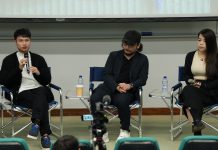As much as he prefers to stay on the safe track, Wu says his life is full of surprises and accidents. After graduating from the National University of Singapore with a double degree in linguistics and sociology, Wu thought he would start a career in the United States or Canada.
“But my parents didn’t want me to be too far away,” says Wu shrugging his shoulders. “So, Hong Kong is a nice compromise.”
Wu arrived in Hong Kong in October 2003, when the city was still under the shadow of SARS. Despite the gloomy economic outlook, he was offered a couple of jobs. In the end, he chose to be an English teacher in the CityU.
“My parents were pleased because it was a respectable job, one that geen duc dou gwong [respectable],” says Wu semi-fluently in Cantonese. “I stumbled upon it [the career of teaching]. It was accidental.”
Since childhood, Wu had aspired to become a reporter, singer or DJ, something related to communication.
As a little kid, he would dress up as a pirate or Superman and perform skits in front of relatives. The self-professed “natural performer” says: “I’m an extrovert and I live for the stage. I live for the attention and the applause.”
Being a teacher for the past nine years has not dimmed Wu’s passion for the stage, he has just found a new one. Wu says the only way to make boring teaching materials seem more interesting is to make them come to life.
“I feel like I have to perform. You know, I feel like the classroom is like my stage. Everyone is my audience and I should make sure my audience connects with me.”
Wu teaches in an almost theatrical manner. Everyone is drawn in by his timely jokes and animated expressions. His classes are never short of laughter. Those who have been to his classes agree that Wu is different from other teachers.
“He has great interactions with students,” says Lai Tsz-king, a third-year student at the CityU who speaks highly of Wu’s enthusiasm for teaching. “He remembers everyone’s names,” Lai adds.
Even though Wu has never been good at names, he believes that learning the students’ names is crucial to engaging the class. “I need to know who are the weak or strong ones. I always give the weaker ones more attention,” he says.






































